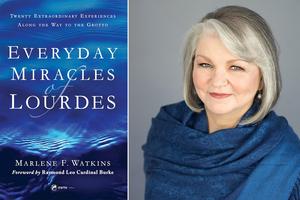Corpus Christi: The Eucharist Is Not a Metaphor
User’s Guide to the Solemnity of the Most Holy Body and Blood of Christ

Sunday, June 2, is the Solemnity of the Most Holy Body and Blood of Christ. Mass readings: Exodus 24:3-8; Psalm 116:12-13, 15-16, 17-18; Hebrews 9:11-15; Mark 14:12-16, 22-26.
On this solemn feast, we are called above all to faith in the fact (as revealed by the Lord himself) that the Eucharist, the Holy Communion of which we partake, is in fact a reception of the very Body, Blood, Soul and Divinity of Jesus Christ, whole and entire, in his glorified state.
The Eucharist is not a metaphor; it is truly the Lord — Christ, whole and entire.
“While they were eating, he took bread, said the blessing, broke it, gave it to them, and said, ‘Take it; this is my body.’ Then he took a cup, gave thanks, and gave it to them, and they all drank from it. He said to them, ‘This is my blood of the covenant, which will be shed for many.’” — Mark 14: 22-24
Scripture attests to this in many places:
- “And he took bread, and when he had given thanks he broke it and gave it to them, saying, ‘This is my body which is given for you. Do this in remembrance of me.’ And likewise the cup after supper, saying, ‘This cup which is poured out for you is the new covenant in my blood’ (Luke 22:19-20).
- “The cup of blessing which we bless, is it not a partaking in the blood of Christ? The bread which we break, is it not a partaking in the body of Christ?” (1 Corinthians 10:16).
- “They recognized him in the breaking of the bread” (Luke 24:35).
- “For anyone who eats and drinks without recognizing the body of the Lord eats and drinks judgment on himself” (1 Corinthians 11:29).
- “I am the living bread which came down from heaven; if any one eats of this bread, he will live for ever; and the bread which I shall give for the life of the world is my flesh” (John 6:51).
This last quote is a profound theology of the Eucharist from Jesus himself in John.
“As Jesus spoke the words saying that the bread was his flesh, the Jewish people grumbled in protest” (John 6:60-61).
But Jesus did not seek to reassure them or to say that he was speaking only symbolically; rather, he became even more adamant, shifting from the polite form of eating, φάγητε (phagete, meaning simply “to eat”), to the impolite form, τρώγων (trogon, meaning to “munch, gnaw or chew”).
So insistent was he, that he permitted most of the people to leave (John 6:66).
Today, Christ asks you and me, “Do you also want to leave me?” (John 6:67). We must supply our answer each time we approach the altar and hear the words, “The Body of Christ.” It is at this time that we answer the Lord, “Amen,” affirming, like Peter, “Lord, to whom shall we go? You have the words of eternal life!” (John 6:68).
Would that all people grasped that the Lord is truly present in our churches and flock to visit him there! As it is, though, only 17% of Catholics attend Mass regularly.
May we delight the Lord every Sunday with our “Amen.”
Amid the National Eucharistic Revival and Pilgrimage, witness to his Presence and what this means for you!
LEARN MORE
Join Father of Mercy Wade Menezes for the free “Eucharistic Devotion” EWTN Online Learning Series at EWTN.com/devotion.

















